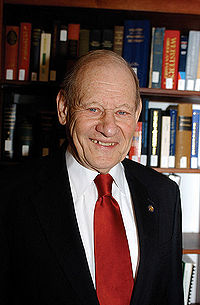Atheism And The Death Penalty
 From Conservapedia
From Conservapedia The atheist author Susan Jacoby wrote in her article Atheism and the death penalty:
| “ | ..Justice Antonin Scalia’s religious justification for the death penalty, which amounts to: God has the power of life and death and lawful governments derive their power from God; ergo, capital punishment is both morally and legally permissible. It is clear, however, that neither atheism nor religion per se is a predictable, decisive factor in public or individual attitudes toward capital punishment. However people choose to rationalize their position, capital puniishment is an emotional issue.
Scalia was half-right in his contention that “the more Christian a country is the less likely it is to regard the death penalty as immoral. Abolition [of capital punishment] has taken its firmest hold in post-Christian Europe, and has least support in the churchgoing United States.” [“First Things,” May 2002] He was only half-right because he was talking only about that part of the world that once comprised “Christendom.” In Saudi Arabia, for example, there is a good deal of kingly and public (insofar as public opinion can be gauged in such a society) support for the death penalty and–the last time I checked–this oil kingdom was emphatically not a Christian nation... In the United States today, secularists are less likely–but only somewhat less likely–to support capital punishment than are the religiously observant. Support is highest, at 71 percent, among evangelical Protestants and lowest, at 59 percent, among those unaffiliated with any religion. White non-Hispanic Catholics, at 67 percent, fall in between the two groups. The important fact here is the clear majority support for the death penalty regardless of religious belief. I know a fair number of atheists who are just as enthusiastic about executing Islamic terrorists as their right-wing Christian compatriots.[1] |
” |
Contents
Center for Inquiry's position on the death penalty[edit]
The Center for Inquiry declares about atheism and the death penalty:
| “ | Humanism cannot support the death penalty.
Humanism stands for a social ethics of equality, individual human rights, justice for everyone, and government that defend their citizens. Humanism stands for valuing the lives of all, individual human rights, justice for everyone, and governments that defend all of their people. These grounds alone are sufficient for abolishing the death penalty. Humanism also stands for elevating human dignity and pursuing the nobler virtues of common humanity. Even if some perfected criminal system could execute only the truly guilty, such murderous machinery is still unworthy of us. Any institution that still encourages vengeance and retribution over equal social justice and protection of everyone is a decrepit perversion of civilization. Humanism looks forward to a time when society consistently respects humane virtues. But a day of execution is day of sadness and shame. May we have mercy on us all.[2] |
” |
13 countries where being an atheists is punishable by the death penalty[edit]
See also: Atheism vs. Islam and Persecution of atheists and Atheism punishable by death and Capital punishment

In several Islamic countries or where Islam has significant influence, atheism is punishable by the death penalty.
In 2016, Siobhan Fenton wrote in the Independent:
| “ | In thirteen countries, you can be sentenced to death for not having a faith:
1. Afghanistan 2. Iran 3. Malaysia 4. Maldives 5. Mauritania 6. Nigeria 7. Pakistan 8. Qatar 9. Saudi Arabia 10. Somalia 11. Sudan |
” |
A Pakistani ex-Muslim said about Islam and the death penalty for atheists, "“The fear of hell and death penalty for apostasy kept me from leaving Islam.”[5]
Muslim mob attacks on atheists[edit]
Deadly mob attack on atheist blogger in Bengladesh[edit]
Christianity Today reported in 2015:
| “ | Atheists and secularists are calling on the international community to act to reverse a growing trend of persecution of the non-religious.
Humanists in the UK are working closely with the Foreign and Commonwealth Office in the UK to ensure the issue of the persecution of atheists is high on the agenda. The problems faced by non-believers in parts of the world were highlighted when a high-profile prominent atheist blogger was hacked to death in Dhaka last month. The blogger's wife accused police of merely standing by while murderers attacked the couple with machetes. Rafida Bonya Ahmed, who lost a finger and suffered head injuries in the killing of Bangladeshi-American Avijit Roy after the couple were returning from a book fair, called on the Bangladeshi government to do everything possible to bring them to justice.[6] |
” |
The Economist on Muslim mob attacks on atheists[edit]
The Economist reports:
| “ | A MOB attacked Alexander Aan even before an Indonesian court in June jailed him for two and a half years for “inciting religious hatred”. His crime was to write “God does not exist” on a Facebook group he had founded for atheists in Minang, a province of the world’s most populous Muslim nation. Like most non-believers in Islamic regions, he was brought up as a Muslim. And like many who profess godlessness openly, he has been punished.
In a handful of majority-Muslim countries atheists can live safely, if quietly; Turkey is one example, Lebanon another. None makes atheism a specific crime. But none gives atheists legal protection or recognition. Indonesia, for example, demands that people declare themselves as one of six religions; atheism and agnosticism do not count. Egypt’s draft constitution makes room for only three faiths: Christianity, Judaism and Islam.[7] |
” |
Atheism, lack of ultimate justice and unpunished criminals[edit]
See also: Atheism and justice and Atheism and forgiveness and Atheism and death
Carson Weitnauer writes about atheism and moral accountability:
| “ | The argument focuses on the fact that, in atheism, there is no authority figure, besides other humans, who can secure justice for everyone. Therefore, if you are both powerful and evil, then there are no real consequences for your immoral behavior. In those cases, there is no justice. You can benefit yourself at the expense of others, thereby reaping a higher quality of life for yourself, and at death it is completely over.
This is a necessary implication of atheism: because there is no authority figure powerful and good enough to secure justice for everyone, there is a lack of ultimate moral accountability for those who do evil. If you can get away with it in this life, there are no consequences for harmful actions. By the same token, for those who make sacrifices to do what is good and right, there is no recompense for what they lost in the pursuit of virtue. This is where the “Bizarre!” reply comes in. The primary atheistic response here is to say, “This argument is so weird! What good is it if you’re motivated to do good just so you don’t get punished? That is so childish! You should be inspired to do what is good just because it is good.” I’m happy to agree with anyone who says this. Being motivated by goodness itself is better than being motivated by fear of punishment. However, life is more complex and challenging than pure idealism allows for. It simply is the case that the more motivations we have to be moral, the better off we are. There very well may be thousands of moments throughout one’s life where the conviction, “I will be accountable for my choices” leads one to make the right choice. But if atheism is true, this conviction is rationally replaced with, “If I can get away with it, it won’t matter.” In addition, the lack of moral accountability erodes our sense of fairness and our desire for justice. There is no hope that, in the end, everyone will get their due. Instead, a clear-eyed, rational perspective is that, in the end, the powerful will get what they want, and too bad for everyone else. Ultimately, the lack of moral accountability is a significant practical challenge for atheism.[8] |
” |
See also[edit]
Notes[edit]
- ↑ Atheism and death penalty by Susan Jacoby
- ↑ The Humanist Case against Capital Punishment, Center for Inquiry
- ↑ 5 facts about the Muslim population in Europe by Conrad Hackett, Pew Forum, November 17, 2015
- ↑ The 13 countries where being an atheist is punishable by death by Siobhan Fenton, Indepednent
- ↑ Ex-Muslim: ‘Fear of hell and the death penalty for apostasy kept me from leaving Islam’
- ↑ Hacked to death for unbelief: The rise of atheist persecution, Christianity Today
- ↑ No God, not even Allah, The Economist
- ↑ Atheism and Moral Accountability by Carson Weitnauer, Website: Reasonsforgod.org
Categories: [Atheism]
↧ Download as ZWI file | Last modified: 02/18/2023 01:17:05 | 15 views
☰ Source: https://www.conservapedia.com/Atheism_and_the_death_penalty | License: CC BY-SA 3.0
 ZWI signed:
ZWI signed:


 KSF
KSF